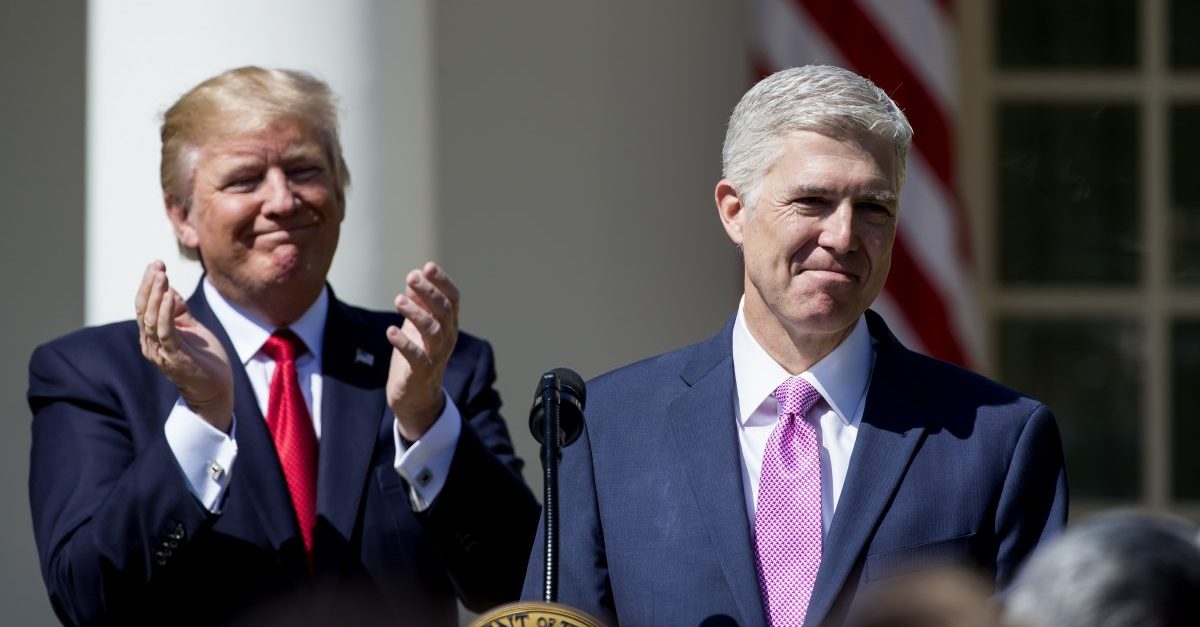
Drama is building at the Supreme Court over the requested depositions of Commerce Secretary Wilbur Ross. Justice Ruth Bader Ginsburg’s Monday night stay was a win for the Trump Administration–even if potentially just a temporary one–and Justice Neil Gorsuch was on hand to challenge Brett Kavanaugh for his position as Trump’s MVP.
Although the Court must have had a five-vote majority to grant the DOJ’s motion for a stay, we don’t actually know how the votes shook out. That’s because no dissents were recorded publicly and the Court, in keeping with its usual practice, did not announce any votes. Gorsuch, however, took the opportunity to set himself apart from his brethren, issuing a concurrence that slammed down arguments against the Trump Administration, and even criticized SCOTUS for failing to go far enough in its ruling.
The underlying case was brought by New York and a coalition of states, cities, counties, and mayors, who are suing to prevent questions about citizenship from inclusion in the 2020 Census. More background on the case here. In September, U.S. District Judge (and Obama-appointee) Jesse Furman ruled that although Ross is an executive cabinet member, he must submit to a deposition; Judge Furman noted that his decision wasn’t a close call, as the case presents a sufficiently “exceptional circumstance,” in which Ross’ “intent and credibility are directly at issue.” Justice Gorsuch disagreed, and boy, was he excited to tell everyone why.
In the concurrence, which was joined by Justice Clarence Thomas, Gorsuch used polite-yet-condescending tones to criticize everyone from those seeking Ross’ deposition, to Judge Furman, to his fellow justices who might unwittingly play into the hands of the plaintiffs. Some might believe Ross had anti-immigrant motives for changing the Census questions; if it’s up to Gorsuch, though, we’ll never know.
First, Gorsuch slammed the District Court for going too far, complaining, “Normally, judicial review of an agency action like this is limited to the record the agency has compiled to support its decision.” Then, as if incredulously describing an impending Salem witch trial, he wrote: “In two weeks, the district court plans to hold a trial to probe the Secretary’s mental processes.”
Any questioning of Ross’ motivation, according to Gorsuch, “is all highly unusual, to say the least,” and would constitute such an “extraordinary claim of bad faith,” as to require commensurate “extraordinary justification.” And Gorsuch is here to let us know that no such justification exists.
Gorsuch’s take can be summed up as, “nothing to see here, folks”:
But there’s nothing unusual about a new cabinet secretary coming to office inclined to favor a different policy direction, soliciting support from other agencies to bolster his views, disagreeing with staff, or cutting through red tape. Of course, some people may disagree with the policy and process. But until now, at least, this much has never been thought enough to justify a claim of bad faith and launch an inquisition into a cabinet secretary’s motives.
The justice also took the opportunity to set himself apart even from members of the Court who might vote with him to shut down Ross’ deposition. After all, it’s conceivable that one of the more liberal members of the Court would side with the DOJ on the basis that deposing a senior official would create too much of a hassle for those at the helm of the government. Remarking that, “the Court apparently thinks the deposition of a cabinet secretary especially burdensome,” Gorsuch argued that the burden isn’t really the point – the lack of basis for the deposition in the first place is. In his view, the Court should not just stay Ross’ deposition, but should also order a halt of all discovery outside the court record on the matter.
Gorsuch ended his concurrence by warning the Court against any tricky maneuvers by the plaintiffs. Those seeking Ross’ deposition could, fearing that SCOTUS will rule against them, simply withdraw their request and proceed to trial. Such a move would render any decision on the stay moot, and would excise SCOTUS from the matter entirely.
If you’re thinking that this seems like a lot of effort for a simple decision on a subpoena, you’d be right. But for Gorsuch, who’s been pushed out of the spotlight by Brett Kavanaugh, this case presented an opportunity for him to put his own spin on support for the executive branch. While Kavanaugh is the go-to guy for immunity, Gorsuch is now the champion for a different kind of deference to the executive. Together, they deliver a one-two punch against those seeking to hold the administration accountable for its actions.
[Image via Eric Thayer/Getty Images]
This is an opinion piece. The views expressed in this article are those of just the author.